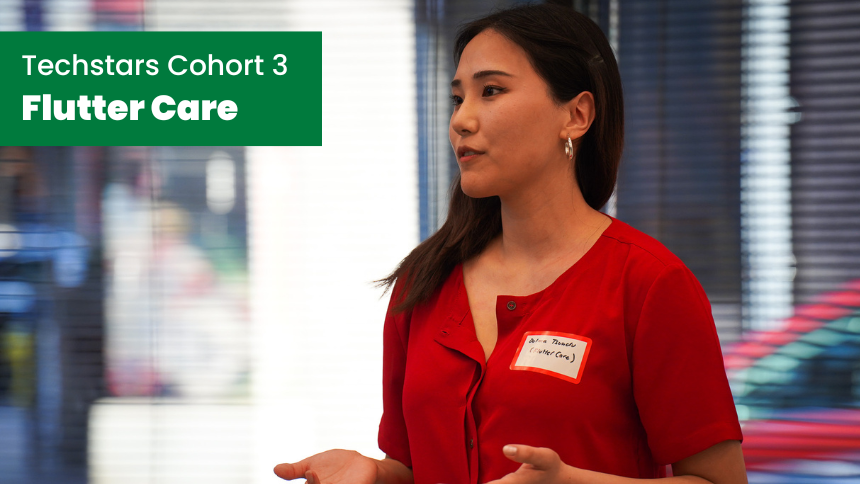
Flutter Care is re-envisioning how to monitor fetal and maternal health
Flutter Care is a part of cohort three of the Techstars Industries of the Future Accelerator in Knoxville.
Dolma Tsundu had a hard start to the world. Her mother experienced a difficult birth with her, riddled with painful maternal complications and long-term effects. Due to that, Tsundu’s early perception of childbirth was an unfair suffering many women must endure to have a child.
“As I got older, I learned that people can have life-changing, beautiful, empowering childbirth experiences,” she said. “Meanwhile, others endure dangerous suffering, pain, and trauma. I made it my priority to help protect the health, safety, and autonomy of every expectant individual.”
It’s the catalyst that propelled her interest in maternal health and to become an advocate for mothers across the globe.
While completing her engineering studies at the University of British Columbia in Vancouver, Tsundu began working on a personal project outside of school that would become a health technology startup called “Flutter Care” and she became certified as a birth doula.
Flutter Care, which is centered around supporting safe and informed pregnancies through innovation, was selected to participate in the Techstars Industries of the Future Accelerator in Knoxville and is gaining major traction in the medical space.
Currently, Flutter Care has a mobile app available that enables expectant mothers to self-report their fetal movements (an important indicator of fetal health) and easily recognize changes in their baby’s pattern. However, while the app does not address the underlying issues of manual ‘kick-counting,’ Tsundu and her team believe that a wearable can.
Flutter Care’s newest technology isn’t a baby heart monitor, it’s more than that. Tsundu explained that the patent-pending technology is a non-invasive wearable device that is placed comfortably on the pregnant belly. It autonomously measures multiple health metrics that can indicate early signs of fetal distress. The data collected by the device can be reviewed by parents and their care team.
In the current system, Tsundu explained that parents go to the clinic for routine check-ups; however, outside of the clinic they are on their own. In the third trimester, parents are advised to regularly track fetal movements to monitor the health status of their baby from home.
The problem: fetal movement patterns aren’t the easiest thing to track. Some babies move a lot, while others move less. It all depends on the unique baseline of the individual baby.
Tsundu said one of the driving forces behind her research for a remote monitoring tool is the fact that there are about two million reported stillbirths per year globally. Meanwhile, research indicates that in high-income countries, stillbirth rates could be reduced by 30 percent.
“So far, the reception from the community has been extremely positive and encouraging – especially from parents who have experienced pregnancy losses,” Tsundu said.
Alongside her work with Flutter Care, Tsundu is also the Co-Founder of the Canadian Collaborative for Stillbirth Prevention (CC4SP), which is an advocacy group composed of parents, healthcare professionals, and advocates with a shared goal to reduce the stillbirth rate in Canada by 30 percent by 2030. The group has been working toward a national strategy with the Public Health Agency of Canada and the Society of Obstetricians and Gynaecologists of Canada.
“My goal, both through Flutter Care and the collaborative is to protect families so they can experience as much joy and connection during pregnancy as possible. I hope to improve health outcomes long-term so that families can look back on these life-changing experiences with positive memories,” she said.
Through her work, she’s met hundreds of families who share stories of loss and trauma with courage, vulnerability, and compassion. Tsundu said this work could not be done without them and they motivate her to keep going, keep inventing, and bring this life-saving technology to the world.
She said the Techstars program has also been very helpful in making this possible.
“It’s been a great way to meet other ambitious founders working on impactful innovations, and to connect with local institutions that can help drive our technology forward, such as the Oak Ridge National Laboratory and the University of Tennessee Medical Centre,” Tsundu said.
Additionally, Tsundu was excited to share that the team received new investment while in the program and has continued to receive interest as they approach the opening of their next round which will support clinical trials and the next stage of development.
She will pitch alongside the 9 other companies in the Techstars cohort on Demo Day, which is set for 4 to 8 p.m. EDT June 6 at Regas Square, 333 West Depot Avenue. The public is invited – to register, click here.
You can follow Flutter Care here.
Like what you've read?
Forward to a friend!

